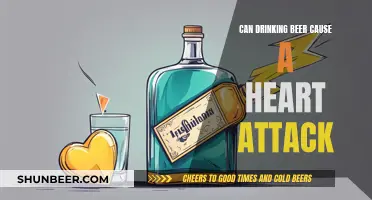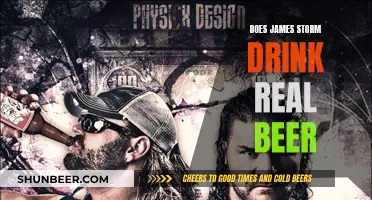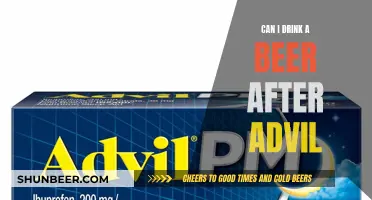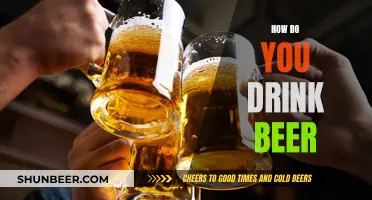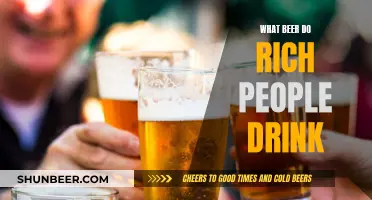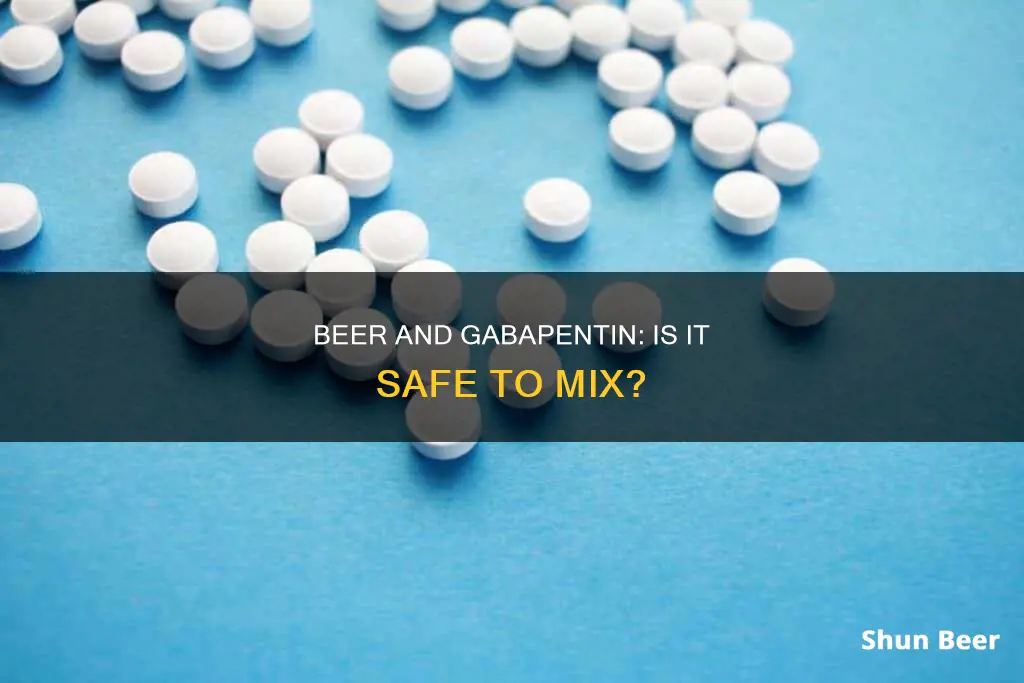
Gabapentin is a drug used to treat nerve pain from seizures or shingles, restless leg syndrome, bipolar disorder, and migraines. It is also used to treat alcohol withdrawal symptoms. While gabapentin is not a controlled substance, it can be abused and is often misused with alcohol. So, can you drink beer with gabapentin? The short answer is no. Combining alcohol and gabapentin can increase the severity of certain side effects such as drowsiness, dizziness, nausea, vomiting, and respiratory depression. In some cases, this can lead to dangerous situations such as impaired driving or even death. Therefore, it is recommended to avoid drinking alcohol while taking gabapentin.
| Characteristics | Values |
|---|---|
| Should you drink beer with gabapentin? | No |
| Why? | The combination of alcohol and gabapentin can worsen side effects such as drowsiness, dizziness, nausea, vomiting, constipation, diarrhoea, respiratory distress, and mood and behavioural changes. |
| What to do if you are struggling with alcohol addiction | Seek professional help |
What You'll Learn

Side effects of combining gabapentin and alcohol
Combining gabapentin and alcohol can have severe side effects and lead to dangerous situations. Both substances are central nervous system (CNS) depressants, and mixing them can cause an increased risk of seizures, overdose, and even death.
- Increased Central Nervous System Depression: Both gabapentin and alcohol are CNS depressants. Mixing them can intensify the depressive effects on the central nervous system, leading to increased drowsiness, dizziness, and impaired coordination. These effects can be dangerous, especially when performing activities that require alertness, such as driving.
- Respiratory Depression: Gabapentin and alcohol can also cause respiratory depression, resulting in slowed and shallow breathing or even respiratory arrest. This can be life-threatening, as the body may not get enough oxygen.
- Nausea and Vomiting: Alcohol can intensify the nausea and vomiting side effects of gabapentin.
- Cognitive Issues: Combining gabapentin and alcohol can lead to cognitive issues, such as confusion and poor decision-making.
- Mood Changes: Both substances can affect mood, and mixing them can result in severe mood changes, including worsening depression.
- Increased Risk of Seizures: Excess alcohol use or alcohol withdrawal can increase the risk of seizures, especially in individuals taking gabapentin for seizure management.
- Other Side Effects: Other potential side effects of combining gabapentin and alcohol include constipation or diarrhea, eye and speech-response delays, fatigue, respiratory distress, behavioural changes, decreased state of consciousness, and impairment in bodily functions.
It is important to note that even if gabapentin is used as prescribed, mixing it with alcohol can lead to dangerous interactions and intensify the side effects of both substances. Therefore, it is recommended to avoid consuming alcohol while taking gabapentin. If individuals struggle with alcohol addiction or substance use disorders, seeking professional help is essential.
Beer Distribution in Georgia: A Complex System Explained
You may want to see also

Why you shouldn't mix gabapentin and alcohol
While gabapentin is considered a safe medication if used as prescribed, it can have dangerous interactions with other substances, including alcohol. Here are several reasons why you shouldn't mix gabapentin and alcohol:
Increased Side Effects
Gabapentin can cause several mild to severe side effects, and consuming alcohol while taking this medication can increase the severity of certain side effects, such as drowsiness, dizziness, nausea, and vomiting. The combination of these substances can also lead to coordination problems, constipation or diarrhea, and cognitive issues such as confusion. These side effects can be dangerous and lead to accidents or injuries.
Impact on Central Nervous System
Both gabapentin and alcohol are central nervous system (CNS) depressants, which means they slow down brain activity. When combined, they can intensify CNS depression, leading to increased risks of drowsiness and dizziness, and impaired thinking and judgment. This can result in poor decision-making and dangerous situations, such as impaired driving or operating machinery.
Respiratory Distress
Mixing gabapentin and alcohol can cause respiratory depression, which occurs when an individual is not getting enough oxygen. This can lead to slowed and shallow breathing or even respiratory failure. Both substances slow down breathing, and consuming them together can have detrimental effects, including an increased risk of seizures, overdose, and death.
Changes in Mood and Behavior
Gabapentin and alcohol are associated with changes in mood and cognitive function. Combining these substances can result in severe mood swings, erratic behavior, and poor decision-making. Additionally, gabapentin has been linked to an increased risk of suicidal thoughts or behavior, and alcohol can worsen depression.
Interference with Medication Effectiveness
Alcohol can interfere with how the body absorbs medications, reducing their effectiveness. It can also increase the concentration of certain medications in the bloodstream to toxic levels. This can be dangerous, especially when combined with the intensified side effects caused by mixing alcohol and gabapentin.
In summary, mixing gabapentin and alcohol can lead to dangerous side effects and put individuals at risk of life-threatening medical emergencies. It is essential to avoid consuming alcohol while taking gabapentin to prevent adverse health consequences. If you are struggling with alcohol addiction or substance abuse, seek professional help.
Jeffrey Dahmer's Beer Choice: What Did He Drink?
You may want to see also

The dangers of mixing gabapentin and alcohol
Gabapentin is a drug used to treat nerve pain from seizures or shingles. It is also used to treat restless leg syndrome, bipolar disorder, migraines, and drug and
Alcohol is one of the most commonly abused substances in the US. It is readily available and can be found in most restaurants and packaged beverage establishments.
Mixing gabapentin and alcohol can be extremely dangerous and can lead to several potential side effects and complications. Here are some of the dangers of combining these two substances:
Increased Risk of Side Effects
Gabapentin can cause several mild to severe side effects, including nausea, vomiting, swelling in the lower legs, feet, ankles, or hands, and changes in mood and cognitive function. When combined with alcohol, the severity of these side effects can increase significantly. Alcohol can also lessen the effectiveness of gabapentin and increase the concentration of the drug in the patient's blood to toxic levels.
Respiratory Distress
Both gabapentin and alcohol slow down breathing. When combined, they can cause respiratory depression, leading to dangerously slow breathing that puts your life at risk.
Memory Impairment
Gabapentin and alcohol can impair memory formation and cause blackouts.
Increased Risk of Overdose
Gabapentin alone is usually not associated with overdose. However, when combined with alcohol, the risk of overdose increases significantly.
Fatal Overdose
Yes, each drug can cause a fatal overdose. While gabapentin is not typically associated with overdose, it can increase the risk of alcohol overdose. Additionally, gabapentin is implicated in overdose deaths from opioids.
Dangerous Behaviour
Mixing gabapentin and alcohol can affect mood, behaviour, and thoughts. This can lead to erratic behaviour and poor decision-making, resulting in injury or death.
In conclusion, mixing gabapentin and alcohol can have severe and potentially life-threatening consequences. It is essential to avoid combining these two substances to prevent dangerous side effects and complications. If you or someone you know is struggling with substance abuse, including alcohol while on a gabapentin prescription, it is crucial to seek professional help immediately.
Beer After Its Best: Is It Safe to Drink?
You may want to see also

How to get help if addicted to gabapentin or alcohol
Mixing alcohol and gabapentin can increase the severity of certain side effects of both substances, such as drowsiness. In some cases, this can lead to dangerous situations, such as becoming extremely drowsy while driving. It can also cause changes in mood and cognitive function, leading to severe mood changes or poor decision-making. In addition, both substances slow down breathing, so combining them could cause breathing to become dangerously slow and put your life at risk. Therefore, if you take gabapentin, you should avoid drinking alcohol and seek professional help if you are struggling with an alcohol addiction.
How to Get Help for Addiction to Alcohol or Gabapentin
If you or someone you know is addicted to alcohol or gabapentin, there are several options for getting help:
- Mutual-Support Groups: Alcoholics Anonymous® (AA) and other 12-step programs provide peer support for people quitting or cutting back on their drinking. These groups are often free and offer flexible assistance, providing a valuable layer of support during recovery.
- Behavioural Treatments: These treatments aim to change drinking behaviour through counselling, led by healthcare providers. They can help individuals develop the skills needed to stop or reduce drinking, build a strong social support system, set reachable goals, and cope with or avoid triggers that may cause a return to drinking.
- Medications: There are currently three medications approved for Alcohol Use Disorder (AUD) in the United States: naltrexone, acamprosate, and disulfiram. These medications can be prescribed by a primary care provider or other healthcare provider and may be used alone or in combination with counselling.
- Treatment Facilities: There are various types of treatment facilities available, including outpatient, intensive outpatient, residential, and intensive inpatient programs. These programs can provide medical detoxification, medication-assisted treatment, residential treatment, and different levels of outpatient care.
- SAMHSA's National Helpline: This is a free, confidential, 24/7 referral and information service for individuals and families facing mental and/or substance use disorders in the United States. They provide referrals to local treatment facilities, support groups, and community-based organizations. They can be reached at 1-800-662-HELP (4357) or via text message at 435748 (HELP4U).
Remember, seeking help for addiction is a courageous step towards recovery. It is important to find a treatment approach that suits your individual needs and to have persistence throughout the process, as overcoming addiction often involves setbacks and continued follow-up.
Beer Slug Traps: Do They Work?
You may want to see also

Gabapentin and alcohol withdrawal
Gabapentin is a medication that has been used to treat seizures since the 1990s. It is now being considered and researched as a treatment for alcohol use disorder. Alcohol use disorder is characterised by compulsive drinking and loss of control despite adverse consequences. It is associated with cravings, tolerance, and withdrawal symptoms.
During alcohol withdrawal, there is lowered GABA function in the nervous system, which causes an increase in brain-stimulating or excitatory chemicals. This leads to more cravings, worsened sleep, and a decline in emotional states. Other symptoms of alcohol withdrawal include tremors, anxiety, sweating, nausea, and tachycardia. In severe cases, it may also involve hallucinations, seizures, and delirium tremens.
Gabapentin is believed to decrease the excitation of the central nervous system by reducing the release of glutamate and increasing the concentration of gamma-aminobutyric acid (GABA), the main inhibitory neurotransmitter in the brain. It is thought that gabapentin can help normalise GABA and glutamate activity during early abstinence, thereby reducing cravings and improving sleep and mood.
Several studies have been conducted to investigate the effectiveness of gabapentin in treating alcohol use disorder and alcohol withdrawal. Some clinical trials have shown that gabapentin can help reduce alcohol cravings and lower the number of heavy drinking days. It has also been found to be safe and effective for mild alcohol withdrawal, improving sleep, mood, and anxiety, which are common triggers for a return to drinking.
However, the research on gabapentin's effectiveness is mixed. Some studies suggest that it may not be more beneficial than other treatments and may not shorten treatment time. It is recommended as a second-line alternative to standard therapies and should be prescribed only after screening for opioid or other prescription drug abuse.
Combining alcohol and gabapentin can increase the severity of certain side effects, such as drowsiness, nausea, coordination problems, cognitive issues, and respiratory distress. Both substances slow down breathing, so ingesting large amounts together may be dangerous and even life-threatening. Therefore, it is advised that individuals taking gabapentin should avoid consuming alcohol and seek professional help if struggling with an alcohol addiction.
Beer as a Hair Conditioner: Does it Work?
You may want to see also
Frequently asked questions
No, drinking alcohol while taking gabapentin is not recommended. Both substances are central nervous system depressants and can amplify each other's effects, increasing the risk of adverse side effects such as drowsiness, dizziness, nausea, vomiting, diarrhoea, and respiratory depression. In some cases, this can lead to dangerous situations, such as impaired driving, and even death.
Combining gabapentin and alcohol can lead to a range of side effects, including:
- Increased drowsiness and dizziness
- Nausea and vomiting
- Diarrhoea
- Respiratory distress
- Worsening depression
- Mood and behavioural changes
- Impaired coordination
- Memory problems
- Increased risk of seizures
- Overdose
- Death
If you are taking gabapentin and wish to consume alcohol, it is important to consult your doctor or healthcare provider for guidance. They can advise you on the risks and help you weigh the benefits and drawbacks of mixing the two substances. It is generally recommended to avoid drinking alcohol while taking gabapentin to minimise the risk of adverse side effects.


